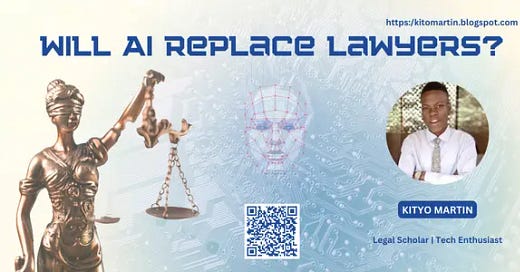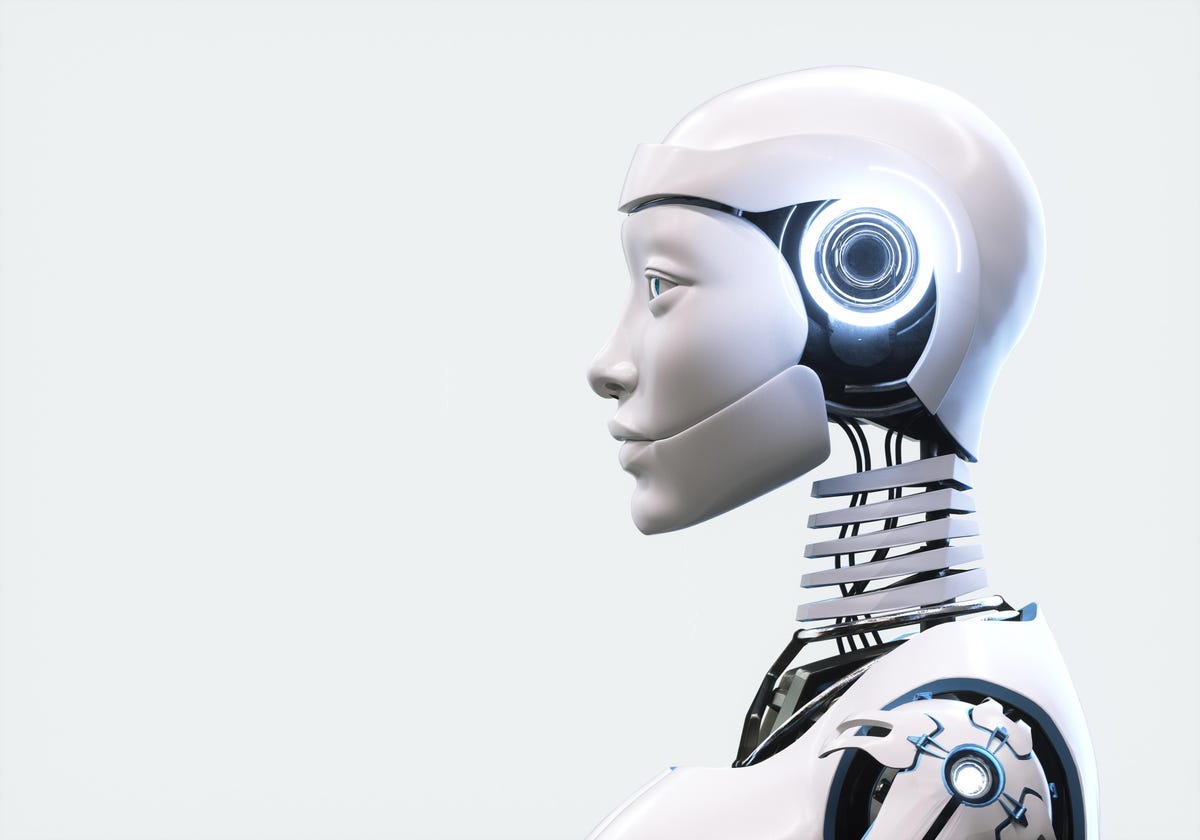#Issue 3 of my periodic newsletter. In this issue, I utter my thoughts on whether AI will replace lawyers.
As technology advances, lawyers and legal professionals are increasingly concerned about the possibility of AI replacing them.
This question has become a hot topic of debate in the legal community, sparking discussions and constant back and forth with everyone having different views.
While some view AI as a potential threat, others see it as an opportunity for innovation and efficiency.
As someone who has been closely studying the rise of AI, I can confidently say that the legal industry is at a pivotal moment. With recent breakthroughs like ChatGPT, the potential for AI to disrupt the legal profession is more significant than ever before.
But the question still stands, will AI replace lawyers?
In this article, I'll explore both sides of the debate and give my perspective on the future of lawyers in an AI-dominated world. Are you ready to find out if AI will replace lawyers?
Let's dive in.
What is AI?
AI, or Artificial Intelligence, refers to the ability of machines to perform tasks that would typically require human intelligence.
AI Use Cases
AI has found its way into numerous fields, each with its own use case.
For example, AI has been used in healthcare to help diagnose and treat patients, identify early warning signs of diseases, and even predict patient outcomes.
In the financial industry, AI is used to detect fraud, optimize investment portfolios, and even assist in customer service.
In the transportation industry, AI is being used to improve traffic flow, reduce accidents, and even automate vehicles and many more industries.
AI is manifest through solving complex problems and helping humans work more efficiently and effectively.
The AI Disruption
However, although AI has brought about numerous positive changes and advancements in various industries, it is also causing significant disruptions. The legal industry is no exception.
By 2025, around 85 million jobs are expected to be replaced by AI, according to the World Economic Forum's recent report on the Future of Jobs. The Legal industry is among the professions expected to be affected by the AI disruption.
38% of employees expect their jobs to be automated, and 13% expect their jobs to be eliminated by 2023. (Source)
This is no different with LAWYERS.
While some argue that it can enhance the efficiency of law firms and provide clients with better service, there's no denying that it's also making some law-related jobs redundant.
As AI technology advances, specific tasks that humans previously performed are now being automated and done by machines.
For instance, AI programs can now carry out document review, legal research, and contract analysis, rendering some paralegal and junior lawyer positions obsolete.
In addition, the ability of AI to handle routine tasks and automate processes may lead to a reduction in the overall number of legal support staff required in law firms.
Businesses have been shaken; more layoffs have occurred as AI takes people's jobs.
This has led some to worry that lawyers who don't adapt to this new reality could soon find themselves out of work.
AI Will Replace Lawyers!
My honest thoughts
I won't lie; I was scared by AI.
I was fascinated by what AI could do efficiently, quickly, and almost accurately.
I gave ChatGPT (an AI trained to understand natural language and respond in a conversational human-like way) a prompt to draft a divorce petition. In seconds, the petition (or a great first draft) was done.
I asked it to explain legal concepts simplistically. For this test, I requested ChatGPT to explain the doctrine of Stare decisis in a beginner-friendly way, and it did so in no time.
I've got to read numerous articles and tweets of lawyers and fellow law students throwing tantrums at AI and heeding under a false belief that AI can’t replace them.
That is the same mentality workers in the pre-first industrial revolution thought about the new manufacturing processes. Many skilled artisans who had been practicing their trade for years realized later that they would be replaced by machines requiring little training.
Some lawyers also believe that AI can't represent clients in court.
Maybe they’ve not heard of innovations like DoNotPay, a bot that can represent a client in court. This bot was set to argue its first court case in February 2023.
But guess what?
The lawyers couldn't let this happen and threatened its creator with jail.
The question is, for how long can they hold such innovations and more for much longer?
AI will take your job. AI will take your clients and leave you with nothing.
But only if;
You're an incompetent lawyer who is not fully skilled in your area of expertise, all-round, half-baked, and not creative.
I’m not here to scare you—and before you start packing up your books and looking for a new career, here’s what I think you should do.
It would be best if you buckled up. Tough times are here, and hence the need for harsh measures.
Why AI Won’t Replace Lawyers. (Not As Yet)
A lot is at stake, and we need to brace ourselves.
However, while there is a fear of being replaced by AI, it's important to remember that the legal profession heavily relies on human expertise.
While it is true that AI can perform many legal tasks faster and more accurately than humans, there are still many things that AI can't do.
AI’s biggest hindrance at the moment is that it is lifeless.
It can't provide the personal touch that a human can provide, which is vital in almost every aspect of a lawyer's career.
AI is not reliable. It is worth noting that AI is not yet perfect. AI systems can sometimes make mistakes or errors that humans would catch, but the AI system cannot. These errors could also have serious consequences, hence the need for a human lawyer.
AI can't have that personal connection, or emotional support clients expect from their lawyers.
AI can’t negotiate on behalf of clients. AI cannot negotiate on behalf of clients as it lacks the interpersonal skills and judgment required to assess and understand the unique circumstances of each case.
Maintaining client-attorney privilege. Strict confidentiality rules bind lawyers, and AI may be unable to ensure confidentiality and protect sensitive information.
Making strategic decisions. Legal professionals are responsible for making strategic decisions that can significantly impact the outcome of a case. These decisions require judgment, experience, and legal knowledge that AI may not have.
AI cannot efficiently argue a case in court or develop a deep understanding of a client's needs and concerns and tailor an argument. Advocacy requires skills such as reading judges' and assessors' minds, thinking objectively, and persuading the court, which AI lacks.
AI is undoubtedly changing the legal profession, but it is not a replacement for human lawyers. Instead, it is a tool that can help lawyers do their job better and more efficiently.
Conversely, it is high time you worked on your ORAL SKILL. Speaking is one of the tools of the trade of a lawyer that will still stay relevant in the 'new era of disruptions'
It would be best if you did not look at AI as a threat but rather as a collaboration tool to ease your work and help you get things done easily and quickly.
Lawyers who will embrace AI and learn to use it to their advantage will be the ones who thrive in the years to come.
Conclusion
So, if you're a law student or a practicing lawyer, don't fear AI.
Although there have been reports of job replacements and automation by AI, around 12 million more jobs are expected to be created by the emergence of AI.
AI is not your enemy. Instead, learn about it, understand it, and find ways to incorporate it into your practice and study.
If you do, you'll be better equipped to provide the kind of service that your clients expect, and you'll be well-positioned to succeed in the rapidly changing world of law.
I hope to be in touch with you soon!
Useful Links
Link to the full post; Will AI Replace Lawyers?
For free Study Notes: Kityo Martin Legal Blog
Join my Telegram Channel: Kityo Martin Telegram Channel
Twitter: The Legal Transit









Share this post